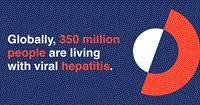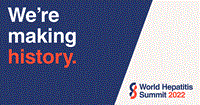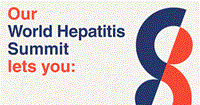Achieving the elimination of viral hepatitis within evolving health systems
The World Hepatitis Summit 2022 will be held from 7 June to 10 June 2022 with the theme: “Achieving the elimination of viral hepatitis within evolving health systems”. The summit will provide the opportunity to promote the new WHO global health sector strategy on HIV, Hepatitis and Sexually Transmitted Infections (STIs) and highlight the key strategic and operational shifts required to end the epidemic of viral hepatitis by 2030. In view of the ongoing COVID-19 pandemic and travel restrictions, the 2022 Summit will be largely virtual with a physical hub for speakers located in Geneva, Switzerland. WHO will be a co-sponsor of this high level summit.
WHO will hold a closed pre-summit hepatitis workshop on 6–7 June 2022 with participants from selected Ministry of Health and other partners and stakeholders.
Objectives
- To recognize the hepatitis achievements made to date, identify gaps in global, regional and national responses and explore opportunities for closing those gaps.
- To communicate key strategic and operational shifts in the newly launched GHSS viral hepatitis strategy to MOH of Member States and key global partners.
- To provide a forum to share experiences and lessons learned and highlight integration opportunities, innovation and collaboration needed to reach VH elimination and validation.
Key sessions
7 June 2022
12:00-13:15: Welcome and High-Level Panel with Jeanette Kagame, First Lady of Rwanda and Dr Tedros Adhanom Ghebreyesus, WHO Director-General
Welcome and moderator: Dr Su Wang, Chairperson, World Hepatitis Summit 2022 Programme Committee, Past President, World Hepatitis Alliance
Speakers:
- Dr Tedros Adhanom Ghebreyesus, Director-General, WHO
- Helen Clark, Former Prime Minister, New Zealand
- Jeannette Kagame, First Lady of Rwanda
- Professor Khaled Abdel Ghaffar, acting Health Minister, Egypt
- Dr Tenu Avafia, Deputy Executive Director, Unitaid
- Charles Gore, Executive Director, Medicines Patent Pool
- Amitabh Bachchan, Bollywood veteran and WHO Goodwill Ambassador for Hepatitis in the South-East Asia Region
13:15-15.15: New momentum and high impact through the new WHO Global Health Sector Strategy with Dr Meg Doherty, Director of WHO's Global Hepatitis Programme and Dr Olufunmilayo Lesi, WHO, Switzerland
Session objective: This session will focus on presenting the progress in viral hepatitis elimination and the new WHO global health sector strategy. Presentations around the different strategic directions will illustrate country progress, innovations, community voices and what it will take to reach elimination.
The 2022–2030 global health sector strategies on HIV, viral hepatitis and sexually transmitted infections guide the health sector in implementing strategically focused responses to achieve the goals of ending AIDS, viral hepatitis B and C and sexually transmitted infections by 2030. The strategies are presented at the World Health Assembly in May 2022 for final approval and vote.
Building on the achievements and lessons learned under the 2016-2021 global health sector strategies, the 2022-2030 strategies consider the epidemiological, technological and contextual shifts of recent years, foster learnings across the disease areas, and create opportunities to leverage innovations and new knowledge for effective responses to HIV, viral hepatitis and sexually transmitted infections.
The strategies recommend shared and disease-specific country actions for the next eight years, supported by actions by WHO and partners. They underline the critical role of the health sector in ending these epidemics, acknowledging that a multisectoral “Health in All Policies” approach is required to remove structural and systemic barriers. The strategies call for a more precise focus to reach people most affected and at risk for each disease and address inequities. They promote synergies under a universal health coverage and primary health care framework and contribute to achieving the goals of the 2030 Agenda for Sustainable Development. They will also facilitate the public health approach towards the elimination of the viral hepatitis epidemic and the importance of measuring progress and validation towards progress.
Chairs: Dr Ren Minghui, WHO Assistant Director-General, Universal Health Coverage/Communicable and Noncommunicable Diseases, and Dr Meg Doherty, Director of WHO's Global Hepatitis Programme
Panel discussion: Championing global strategy in our different context
Roundtable discussion and implication for countries
Upcoming HCV guidance review
16:30-17:30: Hepatitis-free generation: Preventing Mother to Child Transmission with Dr Morkor Newman & Dr Olufunmilayo Lesi, WHO, Switzerland
16:30-17:30: Leave No One Behind with Niklas Luhmann, WHO, Switzerland
8 June 2022
12:00-13:00: Symposium
14:30-15:30: Hepatitis integration with health systems: Opportunities with Universal Health Coverage, Primary Health Care and HIV Services, with Po-Lin Chan, WHO, India
17:00-18:00: Bridging gaps in hepatitis B care and treatment: bringing science and affected communities together, Philippa Easterbrook, WHO, Switzerland and Dr Fuqiang Cui, School of Public Health, Peking University, China CDC, WHO Global Hepatitis Programme
17:00-18:00: Youth Can't Wait - The importance of a youth centered movement response has had in HIV response and lessons for hepatitis, with Wole Ameyan, WHO, Switzerland
9 June 2022
08:00-17:30: Regional workshops
13:30-15:00: Acute viral hepatitis - What is new? with Philippa Easterbrook, WHO, Switzerland
Hepatitis A and E are major causes of outbreaks and acute hepatitis globally, and are both transmitted through ingestion of contaminated food and water or through direct contact with an infectious person. They may rarely cause acute liver failure. Effective vaccination is available for both hepatitis A and E, but there has been some debate about the best vaccination strategy.
The first presentation will cover new WHO recommendations on use of hepatitis A vaccination. The second presentation will profile the first mass hepatitis E vaccination campaign in South Sudan led by MSF. The third presentation will provide updated status on cases globally, and investigations into aetiology, and describe how WHO emergencies programme organises and coordinates a global response.
WHO speakers:
- Christoph Steffen, WHO, Switzerland
- Melanie Marti, WHO, Switzerland
- Farah Al-Shorbaji and Philippa Easterbrook , WHO, Switzerland
10 June 2022
14:30-15:30: The role of good data, surveillance, monitoring and evaluation in elimination, Surveillance for hepatitis - making the hepatitis country data collection system work better, with Daniel Low Beer, WHO, Switzerland
16:30-17:30: Hep Can't Wait and closing remarks: Release of WHS 2022 statement



